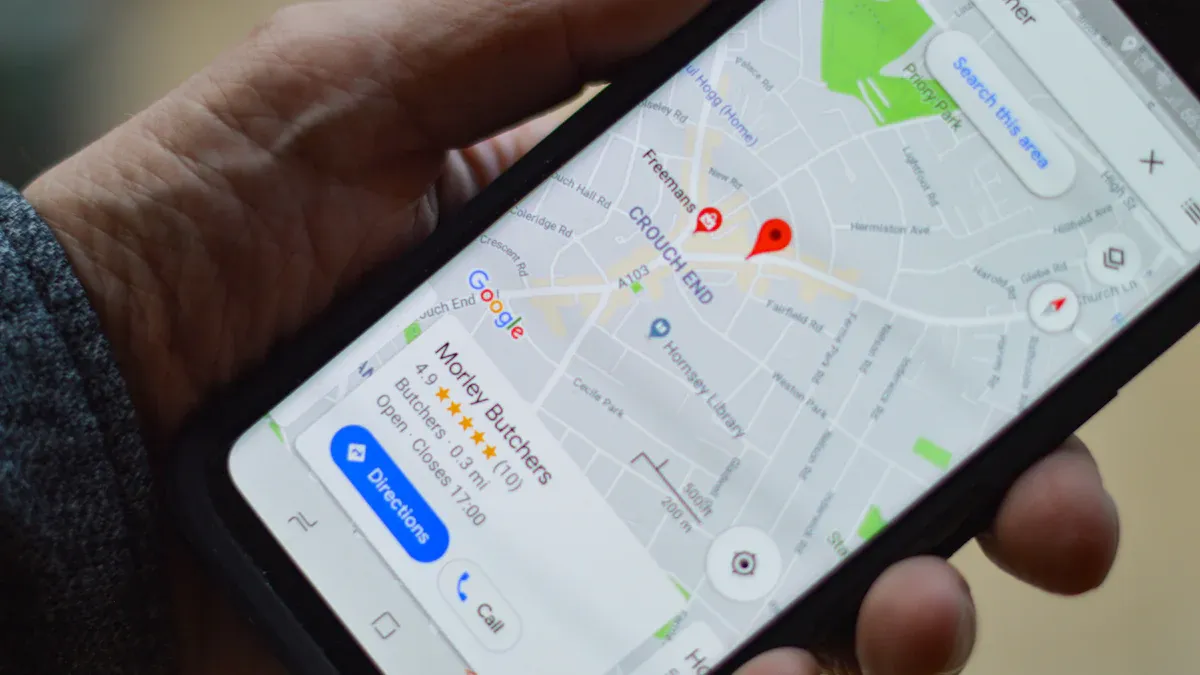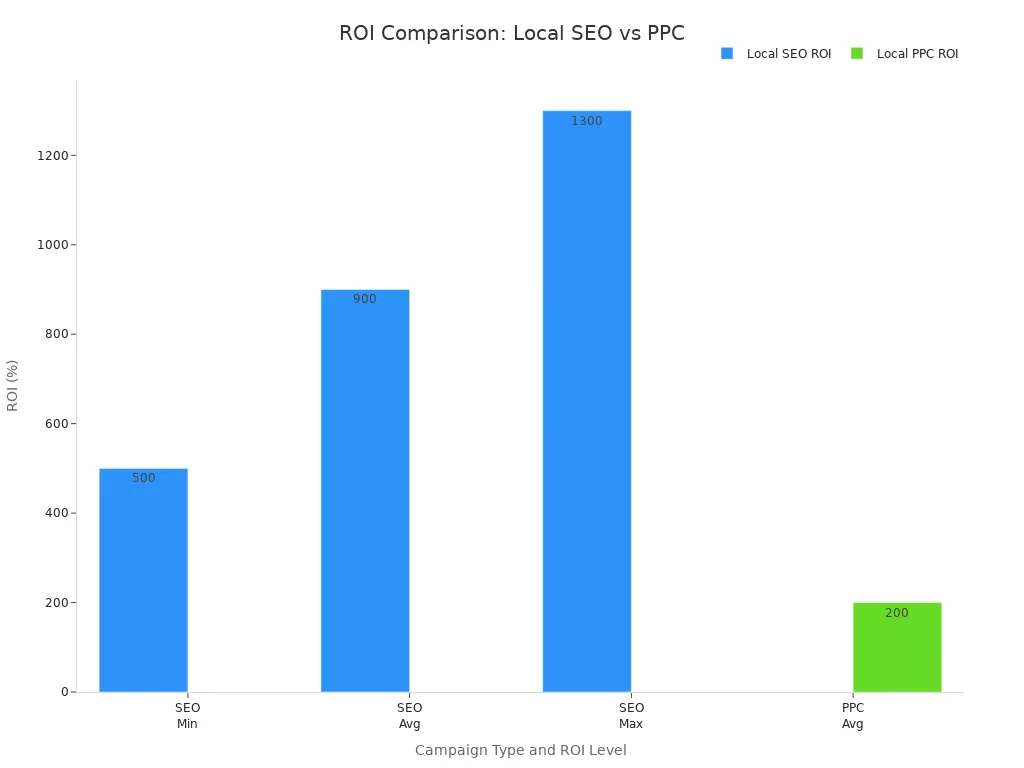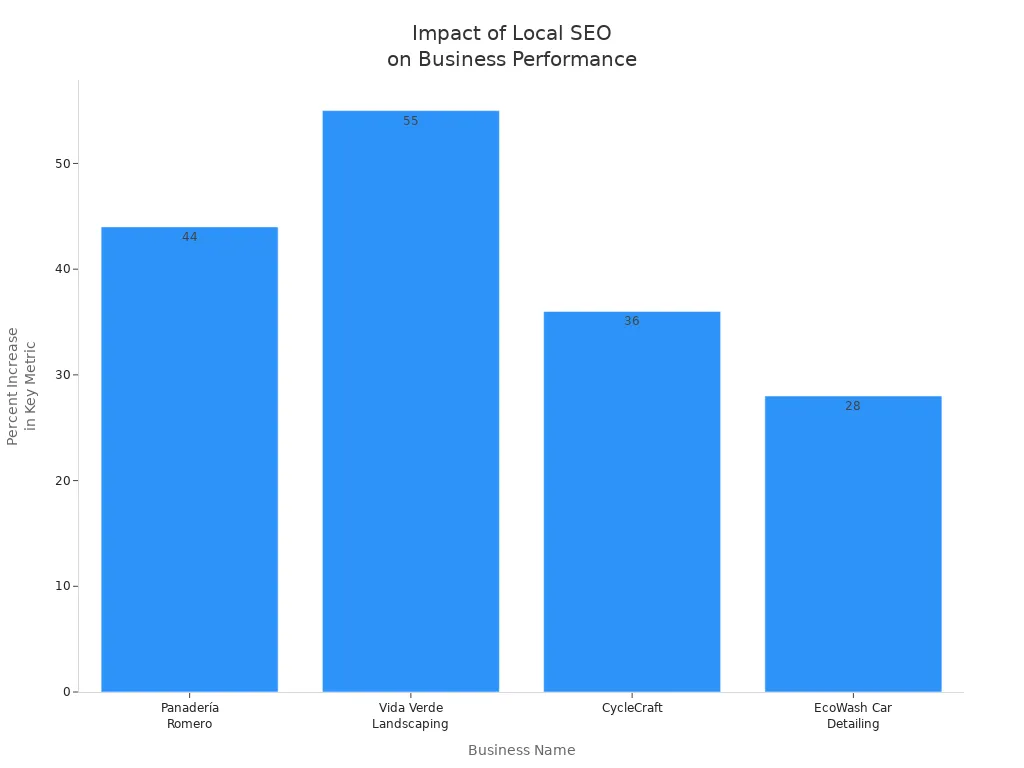Local SEO Competition Strategies to Outrank Your Rivals

Ready to outrank your competition and boost your business in 2025? Local SEO Competition gives you a real shot to shine. When you focus on local seo, you get lower costs, better tracking, and fast results compared to old-school ads.
| Metric | Local SEO | Traditional Marketing |
|---|---|---|
| ROI Tracking | Real-time, precise | Indirect, delayed |
| Budget Flexibility | High | Low |
Take action now. A smart approach helps you outrank your competition and win more customers every day.
Local SEO Competition
Why It Matters
Local SEO competition is a real battle. You want your business to show up first when people search in your area. If you do not outrank your competition, they will grab the clicks, calls, and sales. Local search is a zero-sum game. Only a few spots exist at the top of Google Maps and the local pack. The first result gets almost 28% of all clicks. The next two results get most of the rest. If you are not there, your rivals win. Local SEO competition is not just about being good. You must be better than everyone else nearby.
Think of local search like a race. If you slow down, someone else takes your place. Your goal is to outrank your competition every day.
Google Maps rankings change by location. You might rank first on one street but drop lower just a few blocks away. Tools that scan the map grid show how your position shifts. Local SEO competition means you must watch your spot and keep improving. If you remove spam listings, you can move up and get more customers. Local competition is tough, but you can win if you stay sharp.
Key Ranking Factors
To outrank your competition in local search, you need to focus on what matters most. Here are the main factors that drive local SEO competition:
- Website strength and trust. Make sure your site has strong authority, accurate NAP details, and local content.
- Hyper-local relevance. Your business must show up close to the searcher and have content that matches their needs.
- Customer reviews. Get lots of positive reviews and reply to them. This helps you stand out in local search.
- Mobile experience. Your site should load fast and look good on phones.
- User actions. Google tracks clicks, time on site, and how people use your Google My Business profile.
- Local citations. Build quality local citations from trusted sources. Keep your business info the same everywhere.
- Google My Business optimization. Pick the right categories, use keywords, and keep your profile fresh.
Many businesses make mistakes that hurt their local SEO competition. They forget to update their Google My Business listing, ignore reviews, or use the wrong keywords. Some have inconsistent NAP info or weak local citations. Others do not check their results or fix problems. If you want to outrank your competition, avoid these errors and focus on the key ranking factors. Local search rewards those who pay attention and act fast.
Competitor Analysis

Identify Local Rivals
You cannot outrank your competition if you do not know who they are. Start by searching your main services or products in Google Maps and the local pack. Look at the top results that show up for your target keywords. These are your main local competitors. You want to see who appears in the map results, the local pack, and the regular search listings.
Tip: Search from different locations in your city. Results can change from one street to another.
To make this easier, use tools that help you spot local competitors fast. Here are some options:
- ReviewTrackers' Local Search Rank Checker lets you track your rankings and see who else is winning in the Google Maps Pack.
- ReviewTrackers also gives you competitor analysis features, so you can get insights on what your rivals are doing.
- Local Listing Management tools from ReviewTrackers help you keep your business info up to date and watch your competition.
- Local Falcon gives you a map grid view. You can see exactly where you and your local competitors rank in each part of your area.
You can also use Semrush to dig deeper:
- Use the Review Management tool to compare your reviews with your local competitors.
- Set up Position Tracking with your keywords to see who ranks in the local pack.
- Check the 'Local pack' feature in the reports to spot your main rivals.
- Keep an eye on these reports to track changes and adjust your plan.
Local Falcon stands out because it shows your rankings on a map grid. You get color-coded heatmaps, so you can see where you lead and where you need to improve. The tool lets you set the scan radius as small as 0.1 miles. This helps you understand how your local search position changes from block to block. Agencies and business owners say Local Falcon gives them a clear edge. They can show clients exactly where they need to focus to outrank their competition.
Analyze Strategies
Once you know your local competitors, you need to study what makes them strong. This is where competitor analysis gets serious. Look at their Google My Business profiles, websites, reviews, and even their social media.
Start with their Google My Business listing. Check for these key points:
- Do they use keywords in their business name?
- Is the location in their title?
- Do they list a website and a real address?
- What categories do they use?
- How many reviews do they have compared to you?
- Where do their profile links go?
- Is their NAP (Name, Address, Phone) the same everywhere online?
- Do they have duplicate listings?
- How many photos do they have, and who posted them?
- Can customers book or make appointments?
- Do they show products or services?
- Is their profile 100% complete?
- What performance data do they have, like views, calls, or direction requests?
- How do they rank for your target keywords?
- Are their citations consistent across the web?
Note: A complete audit helps you spot gaps in your own profile. If you see something your rivals do better, you can improve it and outrank your competition.
Do not stop at Google My Business. Visit their websites. Look at their content, keywords, and how easy it is to use on a phone. Read their reviews. See what customers like and what they complain about. Check their social media for posts, events, and customer engagement.
Local Falcon can help you here, too. It tracks your rankings and your local competitors' rankings over time. You get alerts when something changes. The Share of Local Voice metric shows how visible you are in the Google Map Pack compared to others. This makes it easy to see if your changes help you outrank your competition.
Competitor analysis is not a one-time job. You need to check your local competitors often. Local search changes fast. If you want to stay ahead, keep watching, keep learning, and keep improving. That is how you win in local SEO.
Google My Business Listing

Profile Optimization
You want your business to show up first when people search nearby. Start with a complete google my business listing. Fill out every field. Add your business name, address, and phone number. Make sure this information matches everywhere online. Pick the right categories that describe what you do. Write a clear description that tells people what makes you special.
Add high-quality photos of your storefront, products, and team. Businesses with photos get more clicks and direction requests. Upload new pictures often to keep your profile fresh. Top-ranking businesses almost always have fully completed profiles. In fact, 75% of businesses in the top three spots have filled out every detail. If you want to stand out, you need to do the same.
Don’t forget to update your hours, website link, and services. If you have special features, like being women-led or veteran-owned, add those too. These details help you connect with more customers.
Feature Utilization
Google my business gives you free tools to boost your visibility. Use them all! Respond to reviews quickly. This shows you care and helps your ranking. Post updates, offers, or events using Google Posts. Active profiles get more views and clicks.
Tip: Listings with regular posts and reviews can get up to five times more views than inactive ones.
List your services and service area. This helps Google match you with the right searches. Add an appointment link if you take bookings. Answer questions in the Q&A section. Each feature you use makes your business easier to find.
Here’s a quick checklist to maximize your profile:
- Accurate business info (name, address, phone)
- Relevant categories and description
- Services and service area
- Photos and videos
- Reviews and responses
- Google Posts
- Q&A section
- Appointment link
When you use every part of google my business, you give your business the best chance to appear in the local 3-pack and on Google Maps. More visibility means more customers walking through your door.
NAP & Citations
Consistency
You want your business to show up everywhere people search. That means your name, address, and phone number (NAP) must look the same on every site. If your NAP is different on Google, Yelp, or other local directories, search engines get confused. They might not trust your business, and you could drop in local search rankings.
When your NAP is consistent, you build trust with both search engines and customers. People know they can reach you, and Google sees your business as real and reliable.
Here’s why NAP consistency matters:
- Search engines use matching NAP details to check if your business is legit.
- Inconsistent NAP can hurt your reputation and lower your E-A-T score.
- Customers may lose trust if they see different info in local citations.
- Regular audits help you spot and fix mistakes fast.
- Fixing NAP issues can boost your local search rankings by up to 50% and bring in more foot traffic.
Check your NAP on your website, social media, review sites, and all local directories. Make updates right away if you find errors.
Building Citations
Local citations help your business get found online. A local citation is any mention of your business’s NAP on another website. The more accurate local citations you have, the better your chances of ranking higher in local search.
Start with the most trusted sources. In 2025, you should focus on Google Business Profile, Apple Maps, Bing Places, Yelp, and Facebook. These platforms carry a lot of weight with search engines. Next, add your business to local directories that matter in your area or industry.
You can use tools like Widewail, AdviceLocal, or Chatmeter to manage your local citations. These tools help you keep your info up to date across many sites. They also make it easy to fix mistakes and push updates everywhere at once.
Pro tip: Consistent local citations on top platforms can increase your search visibility and bring more customers to your door.
Keep building new local citations on niche sites and local directories. Check your listings often to make sure your NAP stays correct. This ongoing work helps you stay ahead of your competition in local search.
Local Search Content
Local Keywords
You want your business to show up when people use local search. The secret is to use the right local keywords. These are words and phrases that include your city, neighborhood, or region. For example, instead of just saying "pizza delivery," you use "pizza delivery in Austin." This helps you reach people who are nearby and ready to buy.
When you target location-specific keywords, you boost your local search rankings. You get more visibility in map packs and build your brand in your area. You also attract more local traffic because you skip the fight for broad terms. Try adding these keywords to your website content, title tags, headers, and meta descriptions. This makes it easier for search engines to see your business as a top choice for local search.
Pro tip: Create dedicated location pages for each area you serve. Add customer testimonials and embed Google Maps. This improves user experience and helps search engines understand your business location.
A strong local content strategy means you use local search terms in all the right places. You help people find you when they need you most.
On-Page SEO
On-page SEO is how you make your website easy to find in local search. Start with your title tags. Put your main keyword and city at the beginning. Make your meta descriptions clear and full of local keywords. This helps people click your link and tells Google what your page is about.
Use headings (H1–H6) to organize your local content. Add your business name, address, and phone number (NAP) in a spot that’s easy to see. Keep this info the same everywhere. Fast load times and mobile optimization matter a lot. People use their phones for local search, so your site must look good and work fast on any device.
- Use local keywords in your content and meta tags.
- Make sure your NAP is always correct.
- Create local landing pages for each service area.
- Optimize images with alt tags and use local keywords.
- Add local schema markup to help search engines understand your business.
Mobile optimization is key for local search. If your site loads slowly or looks bad on a phone, people will leave. When you focus on these on-page SEO steps, you help your business show up higher in local search results and bring in more local customers.
Backlinks & Partnerships
Local Backlinks
You want your business to stand out in local search. One of the best ways to do this is by earning high-quality backlinks from trusted local websites. These links act like votes for your business. When a respected local site links to you, search engines see your business as more important and trustworthy. Not all links are equal. High-quality backlinks from local news sites, community blogs, and local business directories carry more weight than random links from unrelated sites.
Focus on getting links from websites that matter in your area. You can reach out to local newspapers, sponsor community events, or join local business groups. When your business gets mentioned on these sites, you build authority and trust. Citations and brand mentions on local platforms also help boost your rankings. Search engines look for quality, relevance, and authority in every backlink. The more high-quality backlinks you earn, the better your chances of showing up at the top of local search results.
Tip: Check where your top competitors get their backlinks. You can use this information to find new opportunities for your own business.
Community Collaboration
Working with community organizations gives your local SEO a big boost. These partnerships help you build strong connections and trust in your area. When you team up with local groups, you often get high-quality backlinks from their websites. These links improve your site’s authority and help you rank higher in search results.
- Partnerships with local groups increase your business’s relevance in the community.
- You can join or sponsor local events, which leads to more mentions and reviews online.
- Collaborations create chances for co-marketing, joint events, and user-generated content like photos and testimonials.
- These activities make your Google My Business profile stronger and more appealing to both search engines and customers.
Community partnerships also help you stand out from your competitors. People trust businesses that support their community. You get more local engagement, better reviews, and a stronger reputation. This all adds up to better local search rankings and more customers walking through your door.
Reviews & Reputation
Earning Reviews
You want your business to stand out in local search. Reviews play a huge role in making that happen. According to a BrightLocal study, businesses in the top 3 spots on Google Local have an average of 47 Google reviews. More reviews mean more trust and better chances to show up higher in local search results.
Getting reviews does not have to be hard. Try these steps to earn more authentic feedback:
- Ask your customers for reviews right after you finish a service. Over half of people will leave a review if you ask.
- Use different ways to reach out. Some people like email, others prefer a quick text or even a friendly in-person request.
- Make it easy. Give clear instructions and direct links to your review page. QR codes on receipts or business cards work great.
- Remind your customers. Sometimes people forget, so a gentle follow-up helps.
- Respond to every review. When you reply, people see you care, and they are more likely to leave feedback next time.
Tip: Train your team to ask for reviews naturally. A happy customer is usually glad to help.
Managing Feedback
Managing your reviews is just as important as earning them. Reviews affect your local search ranking, your reputation, and even your revenue. Positive reviews with keywords help your business look more relevant in local search. Recent reviews keep you competitive, and higher star ratings make people more likely to click on your business.
- Respond to all reviews, both good and bad. This shows you value feedback and helps build trust.
- Keep your responses friendly and professional. Thank people for positive reviews and address any problems in negative ones.
- Watch for trends in your feedback. If you see the same issue pop up, fix it fast.
A strong review profile helps you win in local search. When you manage your reputation well, you attract more customers and keep your business growing.
Hyperlocal Engagement
Community Content
You want your business to feel like part of the neighborhood. Sharing community-focused content helps you connect with people nearby and makes your business stand out in local search. When you post about local landmarks, events, or partnerships, you get more likes, shares, and comments. People love seeing familiar places and faces. Visual content, like photos of your team at a local park or a video from a community event, can boost engagement by a huge amount.
Posts with local flavor can get up to 65% more interaction than generic updates. Images with local relevance can increase engagement by up to 650%.
When you create content that highlights what’s happening in your area, you build trust. Customers see you as a real part of the community. They are more likely to leave reviews and recommend you to friends. Responding to comments and reviews shows you care, which helps your reputation and your local search ranking. Consistent local content keeps your business top-of-mind and brings in more visitors from your area.
Local Events
Getting involved in local events is a smart move for your business. When you sponsor, host, or even just attend community events, you get noticed. Your business name shows up on event pages, community websites, and local directories. These mentions help your local search rankings because search engines see your business as active and relevant.
- Sponsoring events often leads to backlinks from local news sites and event calendars.
- Partnering with other local businesses creates chances for cross-promotion and more local backlinks.
- Sharing photos and stories from events on social media drives local engagement and brings more people to your website.
Creating blog posts or landing pages about local events also signals to search engines that your business is connected to the community. Social media posts about your involvement reach local audiences fast and help you stay visible in local search. When you join forces with local groups, you build strong relationships and boost your reputation. This all adds up to better local search results and more customers who know and trust your business.
Paid Local Strategies
Local PPC
You want fast results in local search. Local PPC (pay-per-click) ads can put your business at the top of search results right away. You pay only when someone clicks your ad. This gives you instant visibility, which is great if you need quick leads or want to promote a special offer.
But how does local PPC compare to organic local search? Take a look at this table:
| Metric | Local SEO (Organic) | Local PPC (Paid) |
|---|---|---|
| Average ROI | 5:1 to 13:1 | 2:1 |
| Conversion Rate | ~3.3% | ~1.3% |
| Time to Results | 6-12 months | Immediate |
| Sustainability | Long-term | Short-term |

Local PPC gives you speed, but organic local search brings better returns over time. Most marketers say SEO brings in more sales and a higher return on investment. Still, PPC can help you fill gaps while you build your local search presence.
Targeted Ads
You want your ads to reach the right people in your area. Targeted ads let you do just that. You can set your ads to show only in certain zip codes, cities, or even within a small radius around your business. This helps you get the most out of your budget and reach people who are ready to buy.
- Nextdoor local service ads often get 40% higher conversion rates because people trust local recommendations.
- Local campaigns can see conversion rates from 5% to 15%, much higher than national campaigns.
- Using local keywords like “plumber near Main Street” makes your ads more relevant in local search.
- Google Local Services Ads show at the top of search results and only charge you for real leads.
- Instagram location features boost engagement by 79%, helping more people find you.
You can also adjust your bids for areas where you get more sales. This means you spend more where it counts. Make sure your ad matches your landing page and keep testing what works best. When you use targeted ads, you get more value from every dollar and improve your local search results.
Monitor & Adapt
Track Competitors
You want to stay ahead in local SEO. To outrank your competition, you need to watch what they do. Start by checking your rankings against theirs. List their websites, count how many keywords they rank for, and track their visibility scores. Use tools like SEMrush or BrightLocal to see where you stand. These tools let you spot gaps and find new ways to outrank your competition.
Here are some smart ways to track your rivals:
- Benchmark your rankings against theirs every month.
- Use Keyword Gap tools to find keywords they rank for that you do not.
- Update your list of competitors often. Businesses change, and new ones pop up.
- Segment your ranking data by city or device. You might rank higher on mobile in one area but lower on desktop in another.
- Use local search grids to see how your rankings shift around your business location.
- Check Google Business Profile metrics like calls and clicks for a full view.
- Set up alerts so you know when rankings change.
Tip: Focus on insights that help you take action. Do not just collect data—use it to outrank your competition.
Refine Tactics
You cannot set your strategy and forget it. To outrank your competition, you must keep improving. Regular audits help you spot problems before they hurt your rankings. Use tools like Google Analytics, Google Search Console, and BrightLocal to track your progress. These tools show you what works and what needs fixing.
| Tool Category | Example Tools | What You Learn |
|---|---|---|
| Rank Tracking | SEMrush, BrightLocal | See keyword rankings and changes |
| Competitor Analysis | Ahrefs, SpyFu | Find new keyword and backlink ideas |
| Review Monitoring | BirdEye, ReviewTrackers | Track and manage customer reviews |
| Auditing Tools | Screaming Frog, Moz | Check NAP, technical SEO, and errors |
| Google Tools | Analytics, Search Console | Website traffic and search queries |
Common mistakes can stop you from reaching the top. If you ignore your Google Business Profile, use the wrong keywords, or let your NAP get messy, you fall behind. Make sure your website loads fast and looks good on phones. Build local backlinks and respond to reviews. Always watch for changes in local SEO trends. When you adapt quickly, you can outrank your competition and keep your spot at the top.
You have the tools to beat your local SEO rivals. Focus on your Google Business Profile, use local keywords, earn reviews, and build strong local links. Keep an eye on your competitors and adjust your plan often. Businesses that adapt see big results—like more visits, higher traffic, and better sales.

Stay curious, keep testing new ideas, and never stop improving. Your effort today leads to long-term success in local search.
FAQ
How often should you update your Google Business Profile?
You should update your profile at least once a month. Add new photos, post updates, and check your business info. This keeps your listing fresh and helps you stay ahead of your local competitors.
What is the fastest way to improve local search rankings?
Start by fixing your NAP everywhere online. Then, ask happy customers for reviews. Update your Google Business Profile and add local keywords to your website. These steps can boost your rankings quickly.
Do you need paid ads to win in local SEO?
No, you do not need paid ads to succeed. Strong local SEO can get you to the top. Paid ads help you get quick results, but organic strategies bring long-term growth and better trust.
Which tools help you track local SEO competition?
You can use tools like SEMrush, BrightLocal, and Local Falcon. These tools show your rankings, track your competitors, and help you find new ways to improve your local SEO.
How do reviews affect your local SEO?
Reviews help you build trust and boost your rankings. More positive reviews mean more clicks and calls. Always reply to reviews. This shows you care and helps your business stand out in local search.
See Also
Effective Strategies To Enhance Your Search Engine Ranking
How To Use SEO Writing Tools To Improve Website Rankings
Using Ethical Link Exchange Methods To Strengthen SEO
Key SEO Ranking Elements Shaping Search Results In 2024
Winning SEO Content Distribution Techniques For Marketing Growth

